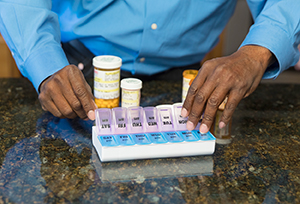A transplanted kidney works like a normal kidney to filter your blood. You won't need dialysis if your new kidney stays healthy. But you need to take medicines to keep it that way.
Preventing organ rejection
Your body's immune system attacks foreign things like germs. It may also attack your new kidney. That's because the new kidney is foreign tissue. The attack is called organ rejection. Medicines can help prevent rejection. You must take antirejection medicines for the rest of your life.
Treating organ rejection
Organ rejection is found and confirmed with a kidney biopsy. Medicine is used to numb the area where a needle will be placed. Then a small sample of kidney tissue is removed through the needle. The tissue sample is checked in a lab by a pathologist.
If rejection does happen, treatment may stop it. If rejection can't be stopped, your new kidney will no longer work. You will then need dialysis to keep you alive. In time, you may be able to have a second kidney transplant.
Side effects of transplant medicines
Medicines to prevent rejection can have many side effects. The medicines weaken the immune system. You may get more infections. They may be more severe. You may also have a higher risk of some types of cancer. Talk with your doctor about side effects and how to manage them.
Keeping your new kidney safe
-
Take your medicines as directed. If you don't, your new kidney will stop working. Then you will need dialysis again.
-
Use a pill box and electronic reminders so you don't forget any doses.
-
See your doctor regularly for blood tests. These check how well your kidney and transplant medicines are working. Keep all of your follow-up appointments.
Working with your care team
-
Talk with your care team to make sure you understand your medicines.
-
Make sure you know all the instructions to keep your new kidney working right.
-
Write down any questions you have about your medicines. Bring them to your appointments.
When to contact your doctor
Contact your doctor right away if:
-
You have any kind of infection.
-
You have any new symptoms.
-
You have problems with your medicines.


